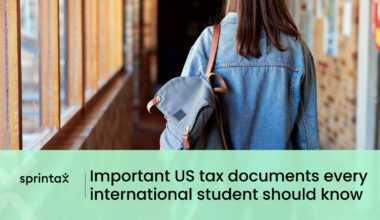(Last updated: 28 January 2025)
Are you a nonresident living in the US? We know it can be confusing to understand the tax system in your home country, let alone in a different one, so we are here to help explain what income is taxable for nonresidents in the US.
As a foreign national you can be subject to one of two different systems of taxation in the US, depending on whether you are classified as a nonresident or resident alien in the US.
If you are a nonresident alien, you are subject to US income tax only on your US source income and just like residents, you must report your income on US income tax returns.
In this guide, we are going to take a closer look at the various different types of income which are taxable in the US and outline our tips on managing your tax requirements.
Tax impact of being a resident vs. nonresident for tax purposes
Resident aliens
If you are classified as a ‘resident alien’ you will be taxed on all of your worldwide income. Resident aliens must report their entire worldwide income just like US citizens on their Form 1040.
As well as this, only foreign scholars and scholar students will be able to claim the benefits of tax treaties.
Nonresident aliens
If you are considered a nonresident alien, you will only be taxed on income you earned from US sources.
The US-source income which is considered “effectively connected” with a US business or trade, such as salary or any other type of compensation is taxed at graduated rates.
US investment income can be reduced by a tax treaty and is generally taxed at a flat 30% tax rate. There are certain types of investment income which may be exempt from US tax.
Read more about your investment income tax requirements here.
How are international students taxed?
Most international students are classified as nonresidents for tax purposes and will be taxed in the same manner as a nonresident alien, which means that international students will be taxed only on income from US sources.
If you are an international student, you must file a tax return if you were in the US the previous tax year. If you did not earn any income, to fulfil your visa obligations you will still need to file the Form 8843.
- Nonresident aliens use Form 1040 NR to report income that is sourced in the US or is connected with a US business or trade.
- Nonresident aliens who receive interest income from deposits with a US bank, loan & savings institution, an insurance company or credit union are exempt from taxation on such interest income as long as it is not effectively connected with a US business or trade.
Some international students can become resident aliens, for example, the F1 visa holders after the fifth year.
Sprintax can help you figure out your residency status and prepare your tax return.
If you have more questions about determining your residency status, please check out our US tax residency guide or contact a live chat agent. Our chat support is available 24/7.

Other taxable income to include on your federal tax return
Interest income
Interest income is the revenue earned by a lender for use of his/her funds over a period of time.
Deposit interests on US bank accounts are nontaxable to nonresidents, but they should be reported on Form 1042-S. Other types of interest income from any other US source paid to a nonresident alien, is taxed at 30% (or lesser tax treaty rate, if applicable).
The beneficial owner may claim the lesser tax rate under tax treaty by filing Form W-8BEN with the withholding agent (payer of the interests).
The beneficial owner is the natural person who owns or controls a company, a trust or a foundation. This is the person who enjoys the benefits of ownership although the title to some form of property is in another name.
Dividend income
Dividend income is paid out of the profits of a corporation to the stockholders.
Dividend income may also be covered by a tax treaty, and it could be taxed at a reduced rate. If the beneficial owner files form W-8BEN with the withholding agent, he/she may claim the lesser tax treaty rate.
Even if the entire amount is exempt under a tax treaty, the withholding agent will report the payment on Forms 1042-S and 1042.
Capital gains
A capital gain is realized when a capital asset is sold or exchanged at a price higher than its basis.
Capital gains income is not usually taxable to a nonresident alien who has been present in the US less than 183 days in a calendar year, however, it is taxable at a 30% tax rate if the presence is 183 or more days.
Taxable capital gains may be subject to reduced tax rate under tax treaty agreements. If you are in receipt of capital gains income, you must report the gains on Form 1040NR.
Read more: Will I pay Capital Gains Tax in the US as a nonresident?
Plasma donations
Any income earned through plasma donations is subject to the same rules and regulations as any other form of income.
The IRS will consider plasma donation payments as taxable income, meaning you’ll need to report it on your tax return.
As well as this, plasma donation centers are required by US law to provide you with a Form 1099-MISC, which will outline the total compensation you received throughout the tax year.
You’ll need to complete this form and file it along with all other tax documents when you prepare your annual tax return.
Learn more about plasma donations tax here.
Teaching/ Research compensation/ pay for teaching
If you are a nonresident alien teacher, researcher or a professor invited by a US university or other accredited institution for research work or teaching at the educational institution under Cultural Exchange Programs on J-1 visa, you will receive this payment.
The good news is, some tax treaties exempt a whole compensation of a J-1 teacher or researcher from tax for a limited number of years, and this is why this category is given a separate income code number.
Compensation during scholarships and grants
You may be an international student or trainee (on F-1, M-1 or J-1 visas) who receives scholarship/grant or personal service income related to your study and training.
Some tax treaties exempt a certain amount of this income, varying by country from $2,000 to $10,000 from tax for a limited number of years if all other requirements of the tax treaty article are met.

Au Pair Wages
Wages paid to Au Pair Visitors are treated as wages paid to household employees. Because au pair wages are paid for domestic services, they are not subject to reporting on Forms W-2 and 941, respectively, the host does not have the obligation to deduct income taxes.
However, Au pair income is fully taxable and similar to dependent personal services, it is considered effectively connected to US trade or business and it is taxable at a graduated tax rate. Similar to students and other foreign nationals, au pairs are required to file US individual income tax returns.
If you are an au pair, you may have an income tax liability on your individual tax return. You should take the following steps:
1. File Form 1040ES-NR if you are a nonresident, and pay income tax payments during the year in instalments or just file an end-of-year tax return on 1040NR form and pay the whole tax liability at once by 15 April, next year. You will need US TIN in both cases – social security number or ITIN.
2. If you and the host family agree, file Form W-4 with the host family, and indicate on line 6 of the form that you wish to have a withholding amount of federal income tax deducted from your weekly wages. Then, the host family must report and pay this withheld tax on Schedule H of Form 1040. You must apply for a US social security number.
Still have questions?
You can contact Sprintax Live Chat to help you with the tax preparation process.

What type of income is not taxable?
Social security and Medicare tax
A nonresident alien on an “F-1,” “J-1,” “M-1,” or “Q-1” visa who is temporarily in the US is not subject to Medicare and social security taxes on pay for services for which the alien was admitted to the US. Medicare and Social security should not be paid or withheld on this amount.
The same exemption from Medicare and social security taxes also applies to employment performed under Optional Practical Training and Curricular Practical Training (off or on-campus) by foreign students “F-1,” “J-1,” “M-1,” or “Q” status, but the employment must be authorized by the US Citizenship and Immigration Services.
Who can help me with the preparation of my US tax return?
If you are a nonresident alien in the US, Sprintax can help you with the preparation of your tax return.
Sprintax is the only online Federal and State self-prep tax software for nonresidents.
When you create your Sprintax account, the system will help you with the preparation of fully compliant Federal and State tax returns.
The software will also assist you to ensure you receive your maximum legal tax refund.
Simply create your Sprintax account to begin your online tax return preparation!
File your nonresident tax return
Can TurboTax help me?
No. TurboTax is the biggest online tax preparation service in the US that helps US residents prepare their tax returns and claim their tax refunds.
You cannot use TurboTax if you are nonresident since the service is available for US residents only. Sprintax is the nonresident tax preparation partner of choice for TurboTax.
Still have questions?
You can contact Sprintax Live chat to help you with the tax preparation process.
With Sprintax you can:
- Save time and stress!
- Determine your residency status>
- Prepare a fully compliant US tax return
- E-file form 1040-NR (eligibility criteria here)
- Maximize your State tax refund
- Avail of our 24/7 Vita Qualified Live Chat facility








